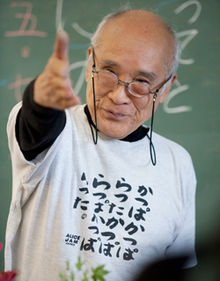music.wikisort.org - Poet
Shuntarō Tanikawa (谷川 俊太郎, Tanikawa Shuntarō) (born December 15, 1931 in Tokyo City, Japan) is a Japanese poet and translator.[1] He is one of the most widely read and highly regarded of living Japanese poets, both in Japan and abroad, and a frequent subject of speculations regarding the Nobel Prize in Literature.[2] Several of his collections, including his selected works, have been translated into English, and his Floating the River in Melancholy, translated by William I. Eliott[3] and Kazuo Kawamura, won the American Book Award in 1989.

Tanikawa has written more than 60 books of poetry in addition to translating Charles Schulz's Peanuts and the Mother Goose rhymes into Japanese. He was nominated for the 2008 Hans Christian Andersen Award for his contributions to children's literature.[4] He also helped translate Swimmy by Leo Lionni into Japanese. Among his contributions to less conventional art genres is his open video correspondence with Shūji Terayama (Video Letter, 1983). Since the 1970s Tanikawa also provided short, onomatopoeic verses for picture books he published in collaboration with visual artist Sadamasa Motonaga, whom he had befriended during his residency in New York in 1966, offered by the Japan Society.
He has collaborated several times with the lyricist Chris Mosdell, including creating a deck of cards created in the omikuji fortune-telling tradition of Shinto shrines, titled The Oracles of Distraction.[5] Tanikawa also co-wrote Kon Ichikawa's Tokyo Olympiad and wrote the lyrics to the theme song of Howl's Moving Castle. Together with Jerome Rothenberg and Hiromi Itō, he has participated in collaborative renshi poetry, pioneered by Makoto Ōoka.[6]
The philosopher Tetsuzō Tanikawa was his father. The author-illustrator Yōko Sano was his third wife, and illustrated a volume of his poems: Onna Ni, translated by William I. Elliott and Kazuo Kawamura (Shueisha, 2012).[7]
Some of his collections available in translation:
- Two billion light-years of solitude
- 62 Sonnets and definitions
- On Love
- To You
- 21
- With silence my companion
- Crestfallen
- At midnight in the kitchen …
- The day the birds disappeared from the sky
- Definitions
- Coca-Cola Lessons
- A letter
- Floating down the river in melancholy
- Songs of nonsense
- Naked
- On giving people poems
- The naif
- Listening to Mozart
- To a woman
- Rather than pure white
- Minimal
- Mickey Mouse by night
- A Chagall and a leaf
- Me
- Kokoro
- Ordinary People
References
- Shapiro, Harvey (12 November 1983). "Books of The Times - New York Times". The New York Times.
- "Prosing the Question" by Mei Jia, China Daily, 2011-12-15. Retrieved 2012-01-03.
- William I. Elliott - Modern Poetry in Translation
- ""Andersen Awards 2008: Nominations", International Board on Books for Young People (IBBY), 2007-07". Retrieved 2012-01-03.
- The Oracles of Distraction
- Tanikawa, Shuntarō, Hiromi Itō, Wakako Kaku, Yasuhiro Yotsumoto, Jerome Rothenberg. Connecting through the Voice, translated by Jeffrey Angles, in Journal of Renga & Renku, issue 2, 2012. p. 169
- "Sensual poetry on love, marriage". 3 March 2013.
External links
- New York Times discusses Tanikawa's Selected Works
- Shuntaro Tanikawa at J'Lit Books from Japan (in English)
На других языках
- [en] Shuntarō Tanikawa
[fr] Shuntarō Tanikawa
Shuntarō Tanikawa (谷川 俊太郎, Tanikawa Shuntarō?), né le 15 décembre 1931 à Tokyo, est un traducteur et poète japonais[1]. Il est l'un des poètes japonais vivants les plus lus et apprécié, à la fois au Japon et à l'étranger, et un sujet fréquent de spéculations relativement au prix Nobel de littérature[2]. Plusieurs de ses recueils, dont ses œuvres choisies, ont été traduits en anglais, et son Floating the River in Melancholy, traduit par William I. Eliott et Kazuo Kawamura, remporte le American Book Award en 1989.[ru] Таникава, Сюнтаро
Сюнтаро Таникава (яп. 谷川 俊太郎 Таникава Сюнтаро:, род. 15 декабря 1931 года) — крупнейший современный японский поэт гэндайси, а также сценарист, автор иллюстрированных книг для детей и переводчик англоязычной литературы на японский. Сын философа Тэцудзо Таникавы и отец композитора Кэнсаку Таникавы. Признан одним из самых известных и любимых поэтов современной Японии. Широко известны его переводы детской литературы («Сказки Матушки Гусыни» и др.). Также Таникава — автор текстов многочисленных песен популярных поп- и рок-групп, а также школьных гимнов.Другой контент может иметь иную лицензию. Перед использованием материалов сайта WikiSort.org внимательно изучите правила лицензирования конкретных элементов наполнения сайта.
WikiSort.org - проект по пересортировке и дополнению контента Википедии